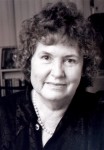Every time Carolyn See received a negative review for one of her books, she would send the critic a bouquet of flowers and a note: “Thank you for your review!”
“They would sometimes end up becoming friends,” said Clara Sturak, See’s daughter. “She had a way of turning things around with incredible cheer.”
Carolyn See, a professor emeritus in the UCLA English department, died of congestive heart failure on July 13. She was 82.
See received her bachelor’s degree in English in 1958 from California State University, Los Angeles, and was accepted into the English graduate program at UCLA the same year. See began teaching in 1970, after serving as a book critic for newspapers such as the Los Angeles Times and The Washington Post. She became a visiting professor at UCLA in 1986, where she taught creative writing and American and Australian literature.
See published her first book, a fiction novel named “The Rest Is Done With Mirrors” in 1970.
See’s eldest daughter Lisa See said her mother thought her first book was going to change her life but it didn’t. However, she kept writing and stuck to her belief that it’s okay to be who you are and pursue your dreams, Lisa See added.
“For a lot of parents and families, saying you want to be a writer is like saying you want to be an actor – they think you’re never going to make a living,” Lisa said. “My mother had terrible odds against her but she did manifest her dreams.”
Lisa added her mother inspired her to adopt writing as a career as well.
“Writing runs in our family,” she said. “We could’ve been brain surgeons, we could have been plumbers… this was just our family business.”
When Lisa See began writing, her mother would send her to the Jack in the Box restaurant because she said it was good preparation for the rest of her life – to learn how to function in the midst of noise and commotion, Lisa See said.
“Her view was, ‘Don’t worry about the muse, just sit down and do your work,’” she said.
Lisa See worked on her latest book in the midst of her mother’s funeral arrangements, she said. She sent the finished draft to her publishers a few days after her mother died.
“It’s been the most wonderful blessing for me to have that hour or so in the midst of this chaos and sorrow to do something that not only meant a lot to me, but also to my mother,” Lisa said.
Sturak said her mother did not have the happiest childhood growing up, but she was very supportive of her daughters. See’s mother was abusive and her father wasn’t present in her life a lot of the time. She said See was sometimes concerned about her own role as a mother.
“She always felt like she was wanting to be the very best mother she could be and sometimes she failed at that,” Sturak said. “(But) I thought she never failed at that. I thought she was the very best mother.”
Sasha Stone, one of Carolyn See’s students and a lifelong family friend, said See was one of the first people who encouraged her to become a writer.
“She was like a mother to me,” Stone said.
Stone said See was an inspiring teacher and writer, who wanted to replace the common, white male characters in American novels with more diverse ones.
Stone said the way See had taught “The Great Gatsby” impacted her because she was able to relate it to their lives in modern-day America.
“As a teacher, she really was interested in breaking new ground,” Stone said. “She never took the old-school way of looking at the great American novel.”
In a statement to the university, English department chair Lowell Gallagher said See was an advocate for writers based in Los Angeles and emphasized Southern California literature.
See wrote about Los Angeles or Southern California because her entire creative life was based there, Lisa See said.
In 1999, See set up the Carolyn See Graduate Fellowship in the UCLA English department for the study of Southern California and Los Angeles literature. Each year, a graduate student receives a monetary award from See for writing a dissertation focusing on Southern California literature.
“She was an inspiring teacher who left an enduring legacy in the department’s graduate and undergraduate programs,” Gallagher said in the statement.
Sturak said See tried to give voices to the students she perceived as outsiders like herself, whether it was because they were gay, immigrants, poor or aspiring writers. See related to them because of her own status as a young single mother with a doctorate in English, trying to be a writer on the West Coast, she added.
“(Seeing) her viewpoint was like cleaning a window because you always saw things differently after you talked to her,” Stone said.
